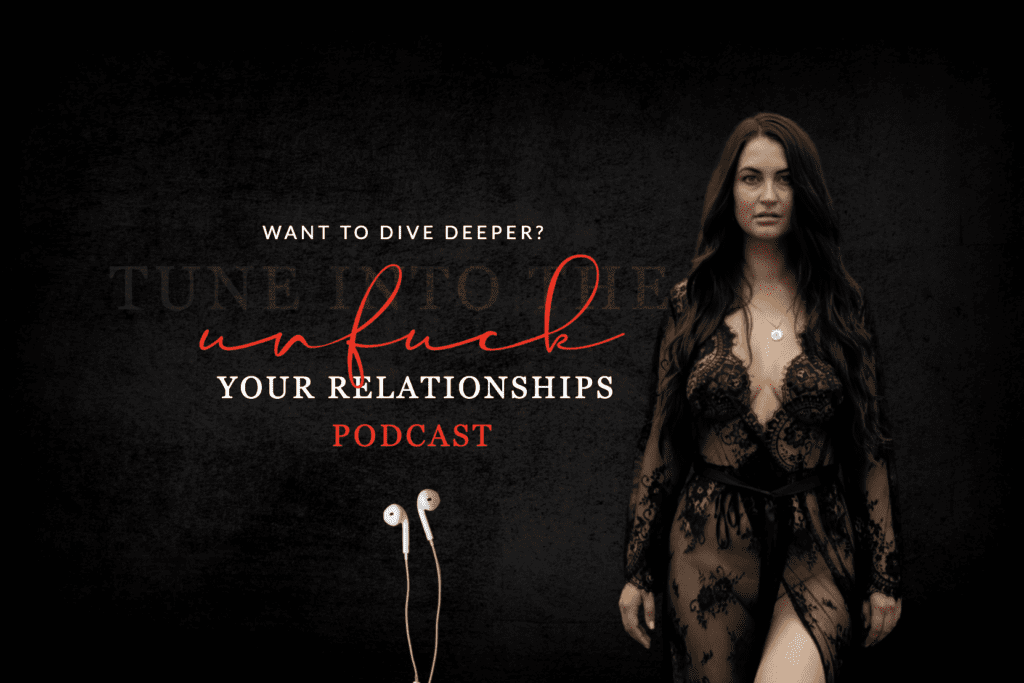The Truth Behind Your Resistance to Setting a Boundary
April 10, 2023
Let’s talk about why it’s so difficult for you to try setting a boundary.
This is a hot topic. If you follow any sort of psychologist, therapist, or coach who works in the arena of relationships, we’re most likely going to be talking about boundaries at some point, and I’m no different. Let’s dive straight in.

Knowledge Versus Wisdom
Now, I’m not going to waste anyone’s time by going into why boundaries are important. You fucking know that. And if you don’t, you can Google it. Instead, I’m going to talk about why this concept of setting a boundary is so hard for people to wrap their heads around.
A lot of people get stuck on boundaries, but to try and get to the bottom of it, they usually ask, “How do I get better at setting a boundary? How do I get better at setting a boundary? How do I get better at setting a boundary?” over and over and over again.
Here’s the thing. This is less about learning how to go about setting a boundary, and more about looking at why you’re not setting a boundary.
I like to describe it like this: let’s say setting a boundary is like pressing your foot down on the gas pedal of your car. But you’ve also got your foot on the brake, which is the part that feels resistant to setting a boundary. So even if you have your foot on the gas pedal full-force, you’re learning all the things about boundaries, and you know what boundaries you want to set, if you have something within you that is in deep resistance to setting boundaries, your other foot is also going to be pressing full-force on the break.
What happens then? You’re going to fucking stall. You’re not going to go anywhere at all.
This is why there’s so much more to personal development than just absorbing information. There’s a really big difference between knowledge and wisdom—knowledge is when you learn something, you know it, and you can regurgitate it, whereas wisdom is deeply embodied knowledge. Wisdom is something made up of lived experience, and that’s what we’re all striving for at the end of the day.
Let’s say you join my program Brat School, for instance, and you learn about emotional intelligence. You now have that knowledge, but if you don’t actually start to do something with that in your personal life, and you don’t start to utilize the actual tools of emotional intelligence, you don’t actually become an emotionally intelligent human being.
It’s the same thing with setting a boundary. It’s all well and good that you’re reading this blog post. I love that for you. But if you’re doing the same cooked shit in your relationships afterward, then you’re not going to fucking go anywhere, are you?
Breaking the Illusion
When it comes to people not wanting to set boundaries, what I see the most is that people don’t want to try setting a boundary because they’re protecting their concept of self. They want to protect the way that other people see them, as well as the way they see themselves.
So if you see yourself as nice, pleasing, sweet, very generous, etcetera, but you exclusively see yourself as all those things and nothing else, setting a boundary isn’t something that fits within those traits. Someone who’s nice and sweet and super generous and giving, you don’t think of that person and associate them with firm boundary-setting, do you?
The reason this happens—and it is actually super fucking manipulative—is that you want people to see you a certain way, so you don’t try setting a boundary because you don’t want to disrupt that illusion.
This isn’t necessarily a conscious thing, but rather an unconscious thing. You want to be seen as someone who’s self-sacrificing, someone who just gives and gives and gives and gives, someone who is selfless…but if your attachment is to be seen as that, then you can kiss setting a boundary goodbye.
You can be selfless all you want, babe, but get ready to say hello to resentment, because that’s all you’re going to get out of refusing to ever set a boundary in favor of appearing a certain way to others.

Breaking the Silence
Another thing I see often is people who wait for the other person to set or spot the boundary.
Come on, people. Seriously. Let’s be self-responsible adults.
If you are expecting the other person to be a fucking mind reader and know where you’re setting a boundary, well…that’s just a really good way to palm off responsibility, isn’t it? “Oh, I just won’t tell them my boundaries. I’ll just expect them to know, and then I’ll be resentful and angry at them when they cross them.”
You don’t get to do that in a conscious relationship. You know why? Because you didn’t hold up your end of the bargain.
It’s one thing to say, “Oh, I actually realized that I didn’t tell you this boundary, but let me tell you now,” versus “Well, if you don’t automatically know that this is a boundary for me, then I’m not going to tell you.” It’s a very immature, childish energy.
Let’s not get mad at people when they don’t respect our invisible boundaries. We need to actually be proactive and communicate our boundaries.
This is our responsibility when we’re in a relationship with someone, whether that’s a friendship, a romantic relationship, a professional relationship, a familial relationship, anything. As soon as you engage with someone, there is a relationship there, and it’s up to you to communicate your own boundaries at that point.
Enforcing Your Boundaries
It’s also up to us to enforce the boundaries we’ve set.
I’ve said it before, I’ll say it again: it’s only a boundary if it’s enforced.
If you try setting a boundary, but you don’t enforce it, that’s not a boundary. That’s a preference.
So if you say, “I don’t want you to cheat on me, and if you do, I’ll leave,” and then they cheat on you and you choose to stay, guess what? That’s not a boundary. That’s a preference.
It’s really important that you are a woman or a man of your word. It’s very important that if you say something is a boundary, you actually fucking enforce it.
The moral of this post is that your boundaries are your responsibility. No one else is going to tell you what your boundaries are, how to enforce them, what they should be, what they shouldn’t be, whatever. They’re yours to handle.

Identifying Your Boundaries
Lastly, you’re not going to be able to set your boundaries if you don’t even know what the fuck they are.
Before we take any of the steps above, if you don’t even know what your boundaries are, you need to go back to the beginning of personal development, and I say that with so much love, but it requires a certain level of self-awareness to even know what our boundaries are.
This is what happens when people are disconnected from themselves. They have no idea. They have become so armored that they can’t even feel where their boundaries are.
We go into this very, very deeply in my program Connected Woman. I have a whole module on boundaries where you’re actually going to figure out what your boundaries are, but I frame it in a really, really unique way, which is really cool.
If you are trying to have a healthy relationship, you don’t know what your boundaries are, but the other person is a very healthy, conscious human being who asks about your boundaries in the relationship…telling them you don’t know is not going to cut it.
Still Not Sure How To Set a Boundary? Work With Me!
So, this is something for you to reflect on. Again, I’m not going to go into how to set a boundary or how to know what your boundaries are, because that’s what my courses are for, but it’s something to reflect on. And if you realize you’re playing into these unhealthy dynamics or not aware of your own boundaries, either join one of my courses, come into one-on-one coaching, go seek out a therapist, whatever it takes to figure it out.
Of course, take care of yourself through this process. Like all of the things that I ever speak about, I’m sure these things are rooted in deep trauma and things you’re going to want to get professional help with so you can get to a regulated place where you can receive this information without it being incredibly triggering.
EPISODE RESOURCES:
Join Brat School, an emotional intelligence school for bratty bitches: https://michellepanning.thrivecart.com/brat-school/
Ready to do the work? You can find all courses, masterclasses, and more right here: https://michellepanning.com/all-offers
CONNECT WITH MICHELLE:
Instagram: http://www.instagram.com/michellepanning
Website: http://www.michellepanning.com

The Truth Behind Your Resistance to Setting a Boundary
MINDSET & EMBODIMENT MENTOR
I'm Michelle
about the host
I get it, girl. I’ve been there too. For years, I was going through the same experiences with men over and over again that left me feeling confused, anxious and pissed off.
I silenced myself in dating and relationships because I was terrified of being judged, rejected and abandoned. It all changed when I went through a break-up and thought “enough is enough. I cannot continue to repeat the same relationships with different men! Something HAS to change!”